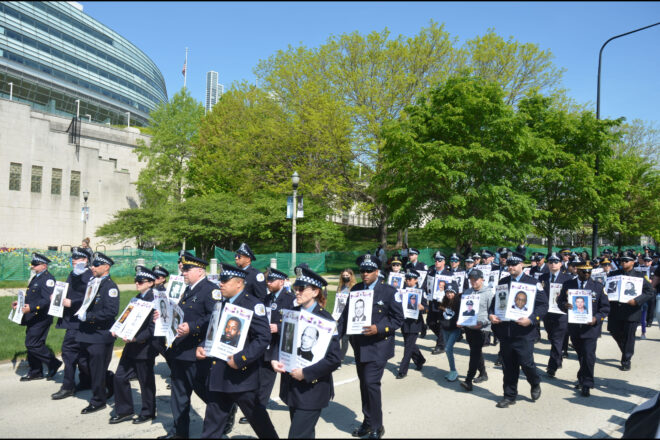Last week, several news sites made reference to an internal email sent from a former commander with the Chicago Police Department (CPD). The email was sent to several CPD members by Captain Melvin Roman on his last day before retiring. The email was a “within the family” message. It was subsequently released publicly by someone other than Captain Roman. The coverage of the email – not the email itself – was a spectacle Chicago moment. Anyone who actually knows Mel Roman knows that he is not one to seek the personal spotlight. He has always been the type of leader to focus on the needs of those he was responsible to lead. He delighted in turning the spotlight toward their accomplishments. That fact alone should help us move past the spectacle and seek the leadership lessons that were offered.
Estimated reading time: 8 minutes
The Full Email from Captain Roman
While several news sites made reference to Captain Roman’s email, most selected excerpts without providing the full message. Two local sites provided the full text. The article with the best coverage was written by Florian Sohnke, founder of the Chicago Contrarian. Sohnke’s article was the first media account. It was published on 1 December 2021, the same day the email was sent. The Contrarian article provided a complimentary introduction that covered the recent career of the leader who authored the email.
Subsequent media coverage was far less accurate in the summary of recent career events relating to former Commander Roman. Additionally, the manner in which they selectively quoted from the email obscured its leadership lessons. The full text of the email is provided in the below PDF for your review.
What the Email Wasn’t
Not mentioned in any of the media accounts, the “subject line” title of the email. It was, “THANK YOU.” Such is not consistent with a spectacle narrative seeking to equate the captain’s message with a “delicious ‘kiss my *ss’ email to the companywide distribution list.” The email was not authored by a former command member who had been “relegated” to a lesser assignment. Nor was the author “sacked” by CPD. The email was not the rant of a disgruntled employee seeking to cause harm. In fact, the author made clear that he “will always love and support” the department he served for more than 31 years.
The email was an expression of gratitude from a leader to those with whom he had worked. The email was an expression of support for CPD’s officers. Yes, the email also included an uncomfortable assessment of several public safety concerns. But, the email is also an opportunity to benefit from the leadership lessons that were offered by an experienced, effective, and dedicated professional.
Not Missing the Key Leadership Lessons
There are three key leadership lessons that we should take from the email. Missing these lessons, misses the point, and misses an opportunity for healing within a department and profession that is suffering. City leaders, including Mayor Lori Lightfoot and Superintendent David Brown, should seek to more visibly demonstrate their own understanding and appreciation of these lessons. But, the opportunity to learn and to be inspired by these lessons are not limited to the mayor and superintendent. Everyone in the department, as well as everyone in the city concerned about public safety, can benefit from thoughtful consideration of the insights expressed in the email.
1: A Leader’s Accomplishments Come Through the Work of Others
While seemingly obvious, many in formal leadership positions can forget their role. Success requires the contributions of others. The leader’s role is to advance the objectives of their group by directing and coordinating the activities of its members. If the group is a hockey team, the objective is winning games. If the group is a business, it is achieving enough sales to keep the business going, pay salaries, and benefit the funding investors. In policing, the objective is enhanced public safety, which is advanced by reductions in crime. As observed by John C. Maxwell, “He who thinks he leads, but has no followers, is only taking a walk.”
Roman demonstrated the leader’s essential need to be concerned for the well-being of others, particularly those from whom the leader must do more than presume to lead. It is they who must do the work. In policing, it is they that are most often in the greatest personal danger. Leaders must gain the respect and trust of those they lead. Their focus must extend far beyond their own personal skills and interests. They must express support and demonstrate gratitude to those they rely upon.
Success for the leader requires that the group achieves its objectives. Achieving the group’s objectives cannot be accomplished alone. Below we have highlighted key portions of the email that speak directly to this key lesson.
2: The Obligations of Command
Leading is not a one-way relationship where one person simply makes demands on others to the leader’s sole benefit. In fact, the best leaders ensure the needs of their group’s mission, and of those carrying it out, are the higher priority over their own needs. Leaders must do the challenging work of establishing strategies that both meet the mission, and safeguard “the crew.” Leaders must set and maintain the standards necessary to meet both of these responsibilities. All leaders are answerable for their actions.
In policing, front-line supervisors are answerable to command personnel. Command personnel are answerable to chiefs and superintendents, and chiefs and superintendents are answerable to mayors and other elected officials. Elected officials are answerable to their community — and all of our leaders are also fundamentally answerable to those they lead. Ultimately, each of us is answerable to God.
Those with leadership responsibilities are obligated to defend the interests of their group, those the group is intended to serve, as well as those within the group. Leaders are obligated to know, and help others to understand, the mission of their organization, as well as what is needed to meet that mission. Leaders must be fully-committed to the mission. Leaders must do the right thing, even when doing so is complicated, difficult, and unpopular.
Leaders must be prepared to make sacrifices in meeting their obligations. Leaders are obligated to assist, encourage, and guide those of higher authority in meeting the demands of their positions. Even when those in higher authority are slow or resistant to listening to others. When required to prevent harm to others, the best leaders must have the courage to challenge higher authority. When appropriate and necessary, leaders even step aside.
Below we have highlighted key portions of the email that speak directly to Leadership Lesson 2.
3: Highly-Effective Organizations Embrace “All-Levels” Leadership
Most often when we first think about the topic of leadership, we make an immediate association with a person holding a formal position or title. This is often described as “positional leadership.” Within the military and policing, we immediately think about those officers holding a higher rank.
How leaders within government exercise their authority, particularly within the military and policing, takes on increased importance. The legitimate use of governmental authority is essential to maintaining a free society that values both public safety and liberty. Autocratic governments inevitably take us to dangerous places. Intimidation-based leadership approaches stifle communication, including the voices of caution warning of the need for correction.
Fundamentally, leadership is about persuasion, and the responsibilities of leadership are not limited to chiefs and superintendents. The most effective leaders inspire others, and they encourage and foster the leadership of those around them, even among those they lead. They listen for the voices of caution and opportunity. This builds from Leadership Lesson 1 above, and from a fundamental truth – in life, none of us can do absolutely everything ourselves. The most effective leaders know that highly-effective organizations stay true to their core values, and they are comprised of highly-effective individuals performing at all levels within the group.
Below we have highlighted key portions of the email that speak directly to Leadership Lesson 3.
This lesson is highlighted in our Leadership Video Series. Each member holds a responsibility to perform as if the success of the organization depends on them alone. Each member has the responsibility to lead by example. It is a responsibility of those holding formal leadership positions to help every member within their organization understand this core principle. Doing so propels the entire group into the top-tier of highly-effective organizations.
Leadership Through Adversity, Without Exception
Leadership is more than words, it is the full expression of all the leader does and does not do. The Eight Levels of Supervisory Engagement, which I have identified and instruct, support the three lessons we observed above. Supervisory excellence is the highest of the eight engagement levels. In my instruction to police managers and executives, I advise that maintaining a supervisory corps functioning at the excellence level is essential to the success of their departments. Excellent supervisors support organizational goals, strategies, and values. They take on an agency’s difficult challenges, and they willingly direct those they lead.
I also instruct that “listening” and “behavior modeling” are core, among 19 skills that they as police executives must utilize and demonstrate in developing excellent supervisors. Such is essential to establishing the leadership vital overall in building a highly-effective organization. Our city, and our police officers, deserve such leadership.
Some years ago, while serving as the executive officer of CPD’s 003rd District, I had the privilege to directly witness the dedication of then newly-promoted Lieutenant Roman. He quickly emerged as a skilled leader. One committed to both the mission of the department and its members. Without question, hundreds of officers have directly benefited from his leadership efforts. More than once during his career, Mel Roman has demonstrated to others, including higher ranking personnel, that our best leaders remain faithful to their duties and obligations, through adversity, without exception – even at personal cost.
“Many will be angry and upset with my words, but I promise you I offer them only out of a deep gratitude and respect for the Officers who serve the great city of Chicago and to a beloved Department which I will always love and support.” – Captain Melvin Roman, 1 December 2021.
Thank you Mel Roman for your service and leadership.
We are interested in your thoughts, and invite you to comment below.


